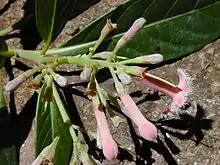| Cinchoneae | |
|---|---|
 | |
| Cinchona calisaya | |
| Scientific classification | |
| Kingdom: | Plantae |
| Clade: | Tracheophytes |
| Clade: | Angiosperms |
| Clade: | Eudicots |
| Clade: | Asterids |
| Order: | Gentianales |
| Family: | Rubiaceae |
| Subfamily: | Cinchonoideae |
| Tribe: | Cinchoneae DC. |
| Type genus | |
| Cinchona | |
The Cinchoneae are a tribe of flowering plants in the family Rubiaceae containing about 125 species in 9 genera. Representatives are found from Costa Rica to southern tropical America.[1] Species within Cinchoneae are characterized as small trees or shrubs with imbricate or valvate corolla aestivation and often dry capsular fruits.[2] Many species contain alkaloids.
Genera
Currently accepted names[1][3][4]
- Ciliosemina Antonelli (2 sp)
- Cinchona L. (24 sp)
- Cinchonopsis L.Andersson (1 sp)
- Joosia H.Karst. (12 sp)
- Ladenbergia Klotzsch (35 sp)
- Maguireocharis Steyerm. (1 sp)
- Pimentelia Wedd. (1 sp)
- Remijia DC. (45 sp)
- Stilpnophyllum Hook.f. (4 sp)
Synonyms
References
- 1 2 "World Checklist of Rubiaceae". Retrieved 19 October 2016.
- ↑ Manns U, Bremer B (2010). "Towards a better understanding of intertribal relationships and stable tribal delimitations within Cinchonoideae s.s. (Rubiaceae)". Molecular Phylogenetics and Evolution. 56 (1): 21–39. doi:10.1016/j.ympev.2010.04.002. PMID 20382247.
- ↑ Bremer B (2009). "A review of molecular phylogenetic studies of Rubiaceae". Annals of the Missouri Botanical Garden. 96: 4–26. doi:10.3417/2006197. S2CID 53378010.
- ↑ Bremer B, Eriksson E (2009). "Time tree of Rubiaceae: phylogeny and dating the family, subfamilies, and tribes". International Journal of Plant Sciences. 170 (6): 766–793. doi:10.1086/599077. S2CID 49332892.
This article is issued from Wikipedia. The text is licensed under Creative Commons - Attribution - Sharealike. Additional terms may apply for the media files.